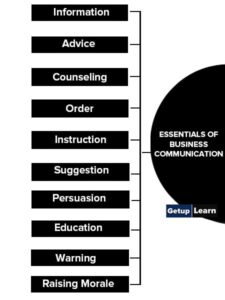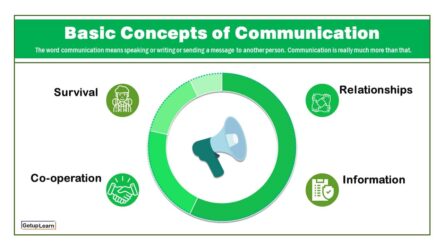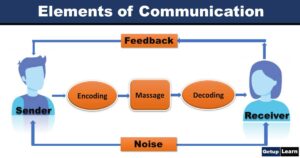Table of Contents
- 1 What is Upward Communication?
- 2 Definitions of Upward Communication
-
3 Importance of Upward Communication
- 3.1 Problems and Difficulties
- 3.2 Assignments and Projects
- 3.3 Performance Reports
- 3.4 Suggestions for Improvement
- 3.5 Grievances and Disputes
- 3.6 Working Environmental Conditions
- 3.7 Availability of Materials and Technologies
- 3.8 Taking Leaves
- 3.9 Personal Problems
- 3.10 Achievement of Goals and Objectives
- 4 Methods of Improving of Upward Communication
- 5 Important Media of Upward Communication
- 6 FAQ Related to Upward Communication
What is Upward Communication?
Upward communication is the process of communication where information flows from down to upward, i.e. from the subordinates to superior levels. The subordinates convey their actions, attitudes and opinions about varied subjects to their superiors.
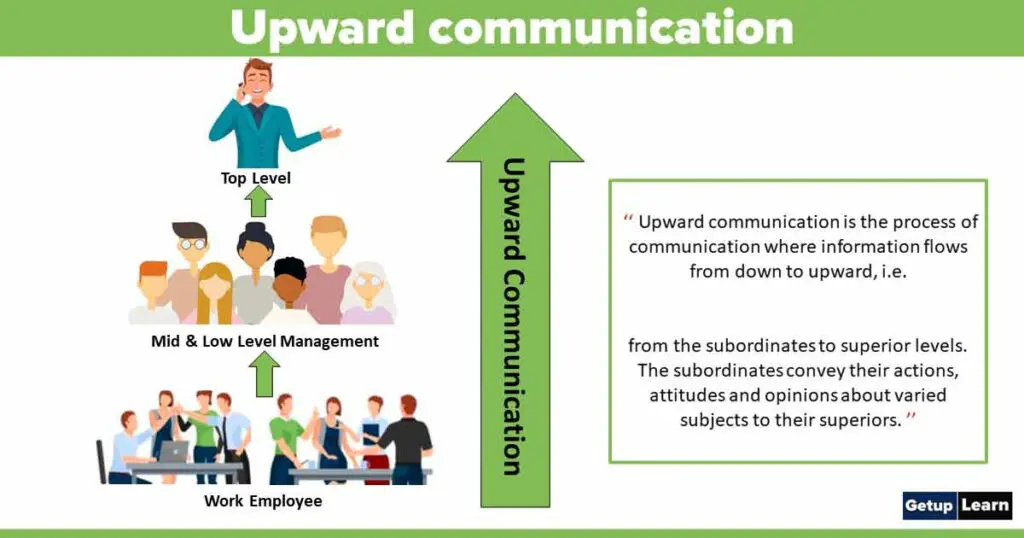
Table of Contents
To put it simply, When information flows from subordinates to superiors, it is called upward communication. The purpose of upward communication is to provide information to the managers from subordinates. Through this communication, subordinates convey their opinions, suggestions, complaints etc. to their superiors.
The lower-level employees initiate upward communication and the message ultimately reaches the upper-level management.
Definitions of Upward Communication
These are the following definitions of upward communication which are given below:
According to Ricky W. Griffin, “Upward communication consists of messages from subordinates to superiors.”
In the opinion of Weihrich and Koontz, “Upward communication travels from subordinates to superiors and continue up the organizational hierarchy.”
Boone, Kurtz and Block said, “Communication that flows from a supervisee to a supervisor, is known as upward communication.”
According to L. C. Bovee and Others, “Upward communication is the flow of information from lower to higher levels in the organization.”
Bartol and Martin defined, “When the vertical flow of communication is from a lower level to one or higher levels in the organization, it is known as upward communication.”
Importance of Upward Communication
The importance of upward communication is given as follow:
- Problems and Difficulties
- Assignments and Projects
- Performance Reports
- Suggestions for Improvement
- Grievances and Disputes
- Working Environmental Conditions
- Availability of Materials and Technologies
- Taking Leaves
- Personal Problems
- Achievement of Goals and Objectives
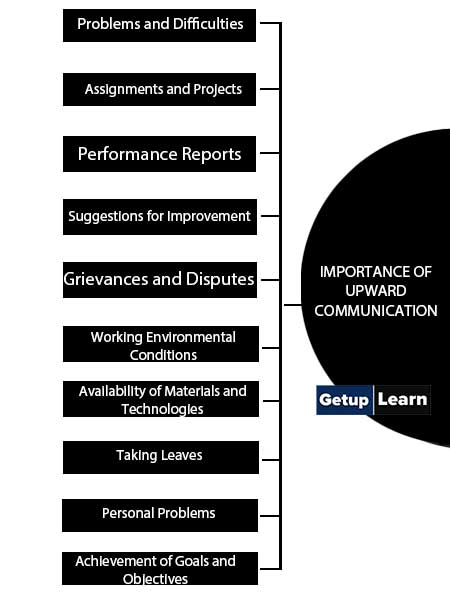
Problems and Difficulties
In organizations and educational institutions, when the individuals are performing their job duties, they in some cases are able to carry them out in a well-organized and manageable manner. Whereas in other cases, they need to obtain ideas, assistance and support from their supervisors and instructors, in terms of problems and difficulties that they have experienced.
When these individuals obtain adequate support and assistance, they are able to provide solutions to their problems and difficulties. When they are acquiring ideas, suggestions, and support, they need to ensure they implement them in a well-organized manner. Therefore, problems and difficulties are regarded as vital factors, which facilitate upward communication.
Assignments and Projects
In the implementation of one’s job duties, it is comprehensively understood that individuals need to work on assignments and projects. In some cases, assignments and projects are worked in groups, whereas, in other cases, the individuals may work on them solely.
After their completion, the individuals need to communicate with their employers and instructors regarding their submission. Hence, submission of assignments and projects is regarded crucial, which facilitates communication from students and employees to their instructors and supervisors. Therefore, assignments and projects are regarded as important in facilitating upward communication.
Performance Reports
In educational institutions and organizations, individuals are engaged in numerous tasks and activities. When the individuals are participating in various tasks and activities, they need to prepare reports. For instance, when the individuals are involved in fieldwork, then they need to prepare performance reports and communicate in terms of them with their supervisors and employers.
Research has indicated that in some cases, particularly when the individuals are working on their assignments, they communicate with their supervisors over the phone or send emails and messages. Therefore, performance reports are regarded as one of the indispensable factors facilitating upward communication.
Suggestions for Improvement
The individuals need suggestions from their superiors in order to perform their job duties well and in achieving the desired outcomes. The suggestions for improvement are not needed at a particular point in time but throughout one’s job duties.
When the individuals experience problems within the course of effective implementation of job duties, they need to obtain suggestions to bring about improvements. When suggestions need to be obtained, the subordinates need to communicate with their superiors.
The communication can be in an oral or written manner. Therefore, it can be stated, suggestions for improvement are regarded as vital in facilitating upward communication.
Grievances and Disputes
Grievances and disputes are usually experienced by individuals in educational institutions as well as in various forms of organizations. The students as well as the individuals employed at various levels experience grievances and in some cases may get involved in disputes and disagreements as well.
When individuals are overwhelmed by grievances and disputes, they need to communicate with their superiors in order to acquire support and assistance. The grievances and disputes are regarded as impediments within the course of implementation of job duties as well. Hence, it is vital to solving them.
Therefore, in order to obtain solutions to grievances and disputes, it is essential to facilitate upward communication.
Working Environmental Conditions
In order to lead to effective growth and development of educational institutions and organizations and to perform one’s job duties well, it is necessary to ensure that the working environment conditions are pleasant and amiable. In order to make the working environmental conditions amiable, the subordinates may communicate with their superiors.
In some cases, when the individuals are overwhelmed due to work pressure, they may communicate with their superiors in terms of extension of target dates, giving them more time and so forth. Therefore, communication in terms of working environmental conditions is vital in leading to upward communication.
Availability of Materials and Technologies
In order to perform one’s job duties well, the individuals make use of various types of materials and technologies. When these are available, the individuals will be able to perform their job duties efficiently. On the other hand, when these are not available, then impediments may take place.
When there is a lack of materials and when technologies are also not in a well-developed state, the subordinates need to communicate with their superiors. In educational institutions as well, when students do not have access to technologies and materials, they communicate with their instructors and supervisors.
Therefore, upward communication takes place in terms of the availability of materials and technologies.
Taking Leaves
When the employees or students are to take leaves from work and educational institutions, they need to communicate in terms of the causes and time duration with supervisors or instructors. When the causes are genuine, then leave is granted. On the other hand, when the causes are not regarded as valid, the leaves get rejected as well.
Leaves are regarded as one of the crucial factors in terms of which upward communication takes place. In some cases, the information in terms of leaves may be given in writing, whereas, in other cases, it takes place in an oral manner. Therefore, upward communication takes place, when the individuals need to take leaves.
Personal Problems
The employees, as well as students, are overwhelmed due to personal problems in some cases. These are related to home, family, finances etc. In accordance with the research studies, they usually do not communicate with their instructors and supervisors in terms of personal problems, unless they are asked.
When the individuals are unable to concentrate on their job duties and assignments due to personal problems, then their instructors and supervisors may communicate with them, in such cases, they impart information in terms of personal problems. Therefore, upward communication takes place in terms of personal problems as well.
Achievement of Goals and Objectives
Achievement of goals and objectives is regarded as one of the indispensable factors in terms of which communication takes place in an effective manner. In the achievement of goals and objectives, upward communication is facilitated in the receiving of guidance, support, help, ideas and suggestions.
With advancements and changes taking place, individuals need to make use of modern, scientific and innovative methods. Hence, knowledge and understanding in terms of the use of these methods and technologies are obtained through communicating with superiors.
Methods of Improving of Upward Communication
The following are some methods of improving upward communication in a school organization:
- The Open-door Policy
- Counselling, Attitude Questionnaires, and Exit Interviews
- Participative Techniques
- The Ombudsperson
- The Union Contract
- The Grapevine
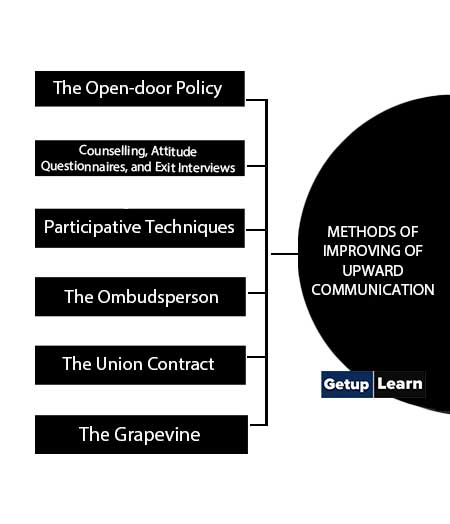
The Open-door Policy
Taken literally, this means that the administrator’s door is always open to staff members. It is an invitation for staff to come in and talk about any problem they may have. In practice, the open-door policy is seldom used. The administrator may say: “My door is always open,” but in many cases, both the staff member and the administrator know the door is really closed. Typically, this does not occur in a learning organization.
Counselling, Attitude Questionnaires, and Exit Interviews
The leader can greatly facilitate upward communication by conducting nondirective, confidential counselling sessions; periodically administering attitude surveys, and holding exit interviews for those who leave the organization. Much valuable information can be gained from these forms of communication.
Participative Techniques
Group decision making can generate a great deal of upward communication. This may be accomplished by the use of union-management committees, quality circles, suggestion boxes, site-based councils, and the like.
The Ombudsperson
The use of an ombudsperson has been utilized primarily in Europe and Canada to provide an outlet for persons who have been treated unfairly or in a depersonalized manner by a large, bureaucratic government.
The Union Contract
A prime objective of the union is to convey to the administration the feelings and demands of various employee groups. Collective bargaining sessions constitute a legal channel of communication for any aspect of employer-employee relations. A typical provision of every union contract is the grievance procedure. It is a mechanism for appeal beyond the authority of the immediate supervisor.
The Grapevine
Although leaders may be reluctant to use the grapevine, they should always listen to it. The grapevine is a natural phenomenon that serves as a means of emotional release for staff members and provides the administrator with significant information concerning the attitudes and feelings of staff members.
Important Media of Upward Communication
The important media of upward communication are mentioned in the follows:
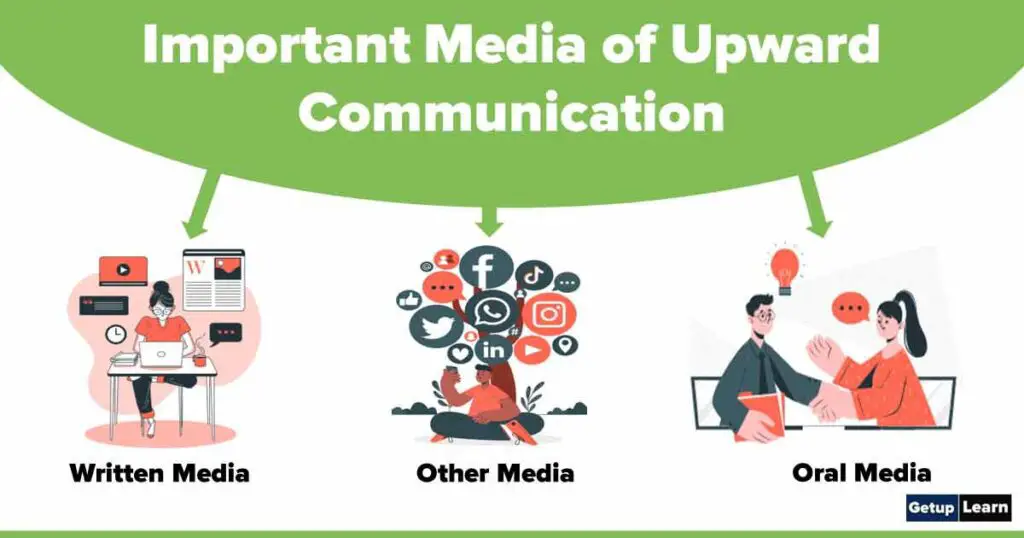
Written Media
The popular written media of upward communication are discussed below:
Report
The report is one of the most important a widely used media of upward communication. Subordinates prepare reports periodically or regularly on various routine issues. They also prepare special reports when the need arises. Reports are then submitted to the higher authority for supplying necessary information.
Memo
The memo is the short form of a memorandum. A memo is a short piece of writings generally used to exchange information amongst the people within the organization. Superiors usually send information to their subordinates through memos. However, subordinates can also write memos to convey essential information to their superiors for making decisions.
Suggestion and Complaint Boxes
Some organizations install suggestion and complaint boxes at some convenient places in the office or factory through suggestion boxes, management invites the employees to submit their suggestions for improving the efficiency of organizational operations. On the other hand, a complaint box is placed to submit any complaint of the employees regarding any aspect of their employment.
Direct Letters
Subordinates can write letters directly to their superiors at their own initiation or they may be asked by their superiors to write about any directed matter.
Questionnaire
Sometimes managers encourage upward communication by asking questions to their subordinates. For this purpose, they distribute questionnaires to the employees. Through questionnaires, management can know the attitudes, feelings and complaints of the employees.
Oral Media
The oral media of upward communication are as follow:
Grievance Procedure
The grievance is employee dissatisfaction over any aspect of their employment. The grievance procedure provides the employees with a formal channel of appeal to their superiors. In modern organizations, there is a well-established procedure for handing employee grievances that acts as a mode of upward communication.
Joint Setting of Objectives
In participative organizations, superiors and subordinates sit together for setting objectives. In this case, the superiors seek information and suggestions from the bottom-level managers and employees.
Employer-employee Meeting
Meeting between employer and employees is a very useful medium of upward communication. In the meeting, the superior can raise problems and seek information, guidelines or suggestions from the subordinates.
Other Media
In addition to written and oral media, superiors can encourage upward communication through the following symbolic medium.
Open-door-Policy
The open-door policy of management inspires the employees to feel that the manager’s doors are always open to them. Whenever they want they can enter the manager’s room and talk everything to the superiors without any fear or hesitation.
These are the commonly used media of upward communication. However, all the media are not suitable for every message. The selection of a particular medium in a particular situation depends on the nature and importance of the message.
How do you communicate upward?
Upward communication is the process of communication where information flows from down to upward, i.e. from the subordinates to superior levels. The subordinates convey their actions, attitudes and opinions about varied subjects to their superiors.
What does upward communication mean?
Communication that flows from a supervisee to a supervisor, is known as upward communication.
What do you mean by upward and downward communication?
Upward communication travels from subordinates to superiors and continue up the organizational hierarchy. Downward communication occurs when information flows down the hierarchy from superiors to subordinates
What are the five important functions in upward communication?
The importance of upward communication is given as follow: Problems and Difficulties, Assignments and Projects, Performance Reports, Suggestions for Improvement, Grievances and Disputes etc.

